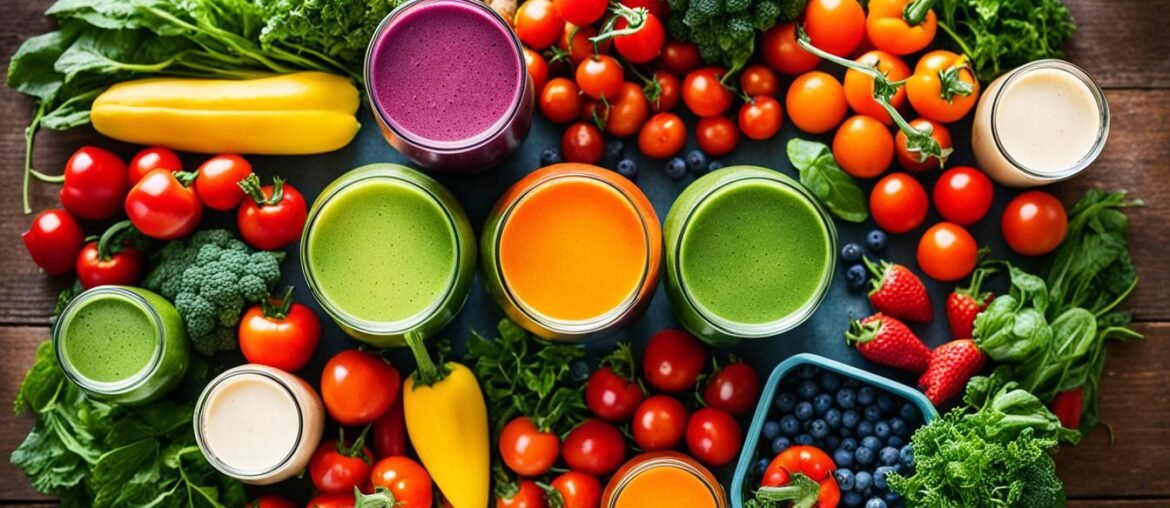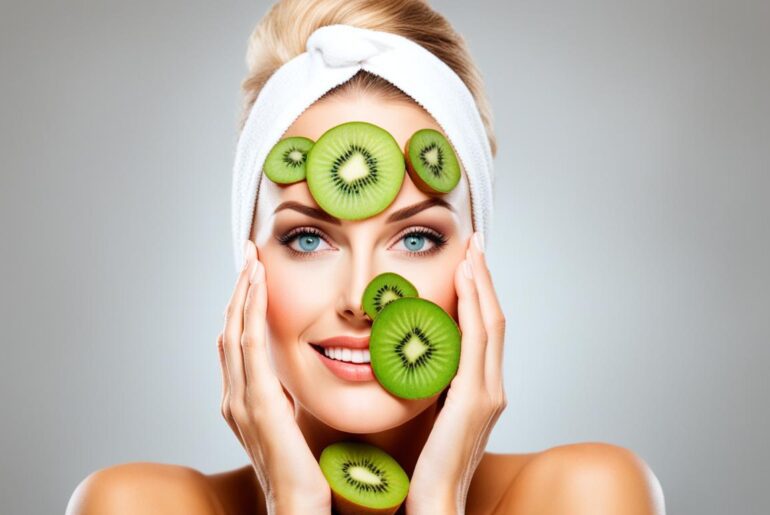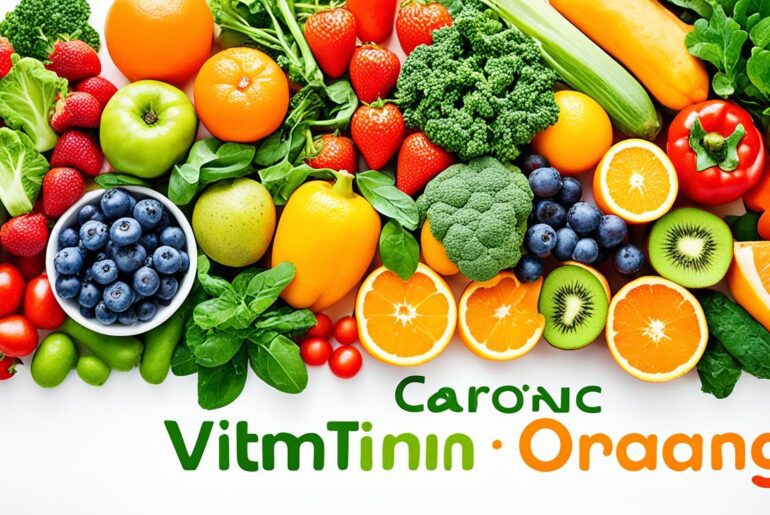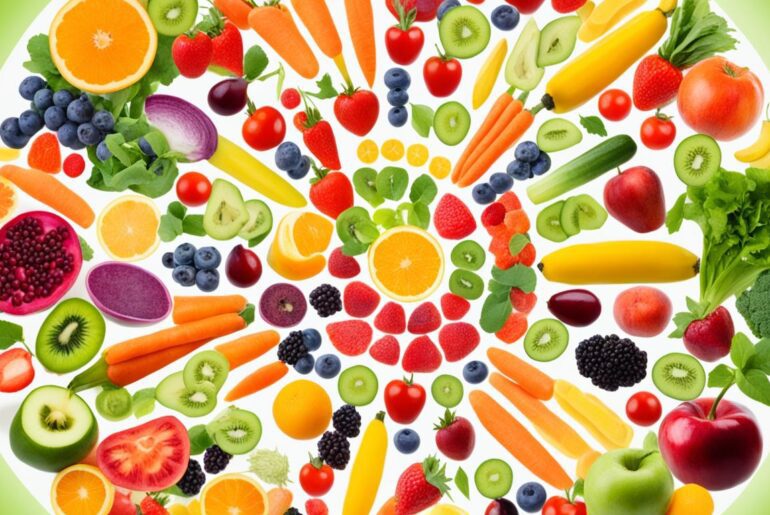Are you searching for the secret to youthful, radiant skin? Look no further than your kitchen and the supplement aisle. Incorporating the right natural antiaging skin vitamins into your routine may be the key to maintaining a youthful complexion and slowing down the aging process. Forget expensive creams and treatments – discover the power of organic skin care and vitamins for youthful skin.
When it comes to aging, we often think of it as an inevitable process. But what if there were ways to defy the march of time and keep your skin looking youthful and vibrant? Scientists have identified several natural antiaging skin vitamins and supplements that can help slow down the effects of aging, supporting healthy aging from within.
Key Takeaways:
- There are natural antiaging skin vitamins and supplements that can support healthy aging and slow down certain aging processes.
- Understanding the causes of aging, including cellular damage and the shortening of telomeres, is key to combatting them.
- Curcumin, found in turmeric, and EGCG, found in green tea, have powerful antiaging properties.
- Collagen supplementation can help maintain youthful skin structure.
- Vitamin C, along with other essential vitamins and supplements, can protect against oxidative damage and promote skin health.
Understanding Aging and its Causes
As we age, our bodies undergo a natural process of change and transition. Understanding the aging process and its underlying causes is essential in supporting healthy aging and preventing age-related diseases. Two key factors that contribute to aging are cellular damage caused by free radicals and the shortening of telomeres.
Free radicals: Free radicals are highly reactive molecules that can damage cells and contribute to the aging process. They are formed through various sources such as exposure to environmental pollutants, unhealthy diet, and stress. Free radicals can cause oxidative stress, leading to cellular damage, inflammation, and increased risk of age-related diseases.
Telomeres: Telomeres are the protective caps found at the end of our chromosomes. They play a crucial role in cellular division and are often compared to the plastic tips of shoelaces that prevent them from fraying. However, with each cell division, telomeres shorten, eventually reaching a critical length where cells can no longer divide properly. This has been associated with cellular aging and the development of age-related diseases.
To promote healthy aging and minimize the effects of these processes, it is important to adopt certain lifestyle habits:
- Follow a nutrient-dense diet that includes a variety of fruits, vegetables, whole grains, and lean proteins. These foods are rich in antioxidants, which help combat the damaging effects of free radicals and promote cellular health.
- Engage in regular physical activity, including both cardiovascular exercises and strength training. Exercise has been shown to improve overall health and reduce the risk of age-related diseases.
- Avoid smoking and excessive alcohol consumption, as both habits can contribute to cellular damage and accelerate the aging process.
By taking proactive steps to support healthy aging, we can optimize our well-being and reduce the risk of age-related diseases.
Curcumin: The Antiaging Power of Turmeric

When it comes to slowing down the aging process and promoting longevity, curcumin, the main active compound in turmeric, has shown incredible potential. Not only does curcumin possess powerful cellular protective properties, but it also exerts potent antioxidant effects on the body.
Curcumin has been found to activate proteins that help delay cellular senescence, the process where cells lose their ability to divide and function properly. By doing so, curcumin promotes healthy aging and supports the maintenance of youthful cells.
Animal studies have provided compelling evidence of curcumin’s antiaging effects. Research has shown that curcumin can combat cellular damage, increase lifespan, and alleviate age-related symptoms. This natural compound has also been found to promote brain health and protect against age-related cognitive decline.
To increase your intake of curcumin, you can incorporate turmeric into your cooking or consider taking turmeric or curcumin supplements. However, it’s important to note that curcumin’s absorption is enhanced when consumed with black pepper or combined with fats/oils, so keep that in mind when utilizing this natural antiaging powerhouse.
To give you a better idea of the potential benefits of curcumin, here’s a table summarizing its effects:
| Effect | Description |
|---|---|
| Promotes Cellular Health | Curcumin activates proteins that help delay cellular senescence, supporting healthy aging. |
| Powerful Antioxidant | Curcumin exerts potent antioxidant effects, protecting cells from oxidative damage. |
| Increases Lifespan | Animal studies have shown that curcumin supplementation can extend lifespan and improve overall health. |
| Alleviates Age-Related Symptoms | Curcumin has been found to alleviate age-related symptoms and improve brain health. |
Curcumin’s beneficial effects on cellular senescence and antioxidant protection make it a valuable addition to any antiaging routine. Whether through cooking with turmeric or taking curcumin supplements, incorporating this natural compound into your lifestyle can help support healthy aging and enhance overall well-being.
EGCG: Green Tea’s Antiaging Secret
When it comes to antiaging secrets, green tea takes the spotlight with its powerful compound called epigallocatechin gallate (EGCG). This polyphenol, abundantly found in green tea, offers numerous anti-aging benefits that can support a healthy aging process.
One of the key ways EGCG promotes healthy aging is by improving mitochondrial function. Mitochondria are the energy powerhouses of our cells, and as we age, their function naturally declines. However, studies have shown that EGCG can help boost mitochondrial function, providing a cellular energy boost that contributes to overall wellbeing and vitality.
In addition to enhancing mitochondrial function, EGCG also induces autophagy. Autophagy is a natural cellular process that removes damaged or dysfunctional components, allowing cells to maintain their health and integrity. By stimulating autophagy, EGCG assists in cellular cleansing and rejuvenation, helping to slow down the aging process.
Furthermore, green tea’s EGCG has shown remarkable skin benefits. It protects against aging skin by preventing the breakdown of collagen and elastin, two essential proteins responsible for maintaining skin elasticity and firmness. EGCG also shields against hyperpigmentation caused by UV light, minimizing dark spots and uneven skin tone.
Moreover, a comprehensive study published in the Journal of the American Medical Association found that green tea consumption is associated with a reduced risk of disease and death. The research highlighted the potential of EGCG in promoting longevity and overall health.
To reap the anti-aging benefits of EGCG, incorporate green tea into your daily routine or opt for green tea extract supplements. By doing so, you can harness the power of this natural compound to support healthy aging and enhance your overall well-being.
Green Tea’s Antiaging Benefits:
| Benefits of EGCG | Benefits of EGCG |
|---|---|
| Improves mitochondrial function | Induces autophagy |
| Protects against aging skin | Reduces hyperpigmentation |
| Associated with reduced risk of disease and death |
Discover the antiaging power of green tea and EGCG. Embrace this natural secret to support healthy aging and enjoy its manifold benefits!
Collagen: Maintaining Youthful Skin Structure

Collagen is a vital protein that plays a key role in maintaining the structure and elasticity of the skin. As we age, the production of collagen decreases, leading to the formation of wrinkles and dryness in the skin.
To combat the signs of aging and promote youthful skin, supplementing with collagen has shown promising results. Collagen supplements help replenish the body’s collagen levels, reducing the appearance of wrinkles and fine lines.
One of the significant benefits of collagen supplementation is its ability to improve skin hydration. As collagen promotes moisture retention in the skin, it helps combat dryness, leaving the skin plump and supple.
Additionally, collagen supplements contribute to improved skin elasticity. By supporting collagen synthesis, these supplements help restore the skin’s firmness and elasticity, reducing sagging and promoting a more youthful appearance.
To illustrate the benefits of collagen supplementation, here is a summarized table:
| Benefits of Collagen Supplementation |
|---|
| Reduces the appearance of wrinkles and fine lines |
| Improves skin hydration |
| Enhances skin elasticity |
Collagen supplements are available in various forms, including powders and capsules. It is recommended to choose high-quality collagen supplements from reputable brands to ensure maximum effectiveness.
Remember, always consult with a healthcare professional before incorporating any new supplement into your routine to ensure it aligns with your specific needs and health conditions.
CoQ10: An Antioxidant for Age-Related Decline
Coenzyme Q10 (CoQ10) is a natural antioxidant produced by the body. As we age, the production of CoQ10 declines, leading to increased oxidative stress and age-related decline. Supplementing with CoQ10 can have numerous benefits for overall health, particularly heart health.
Oxidative stress occurs when there is an imbalance between free radicals and antioxidants in the body. Free radicals are unstable molecules that can damage cells and contribute to the aging process. Antioxidants like CoQ10 neutralize free radicals, protecting cells from damage and reducing oxidative stress.
Several studies have shown that CoQ10 supplementation can improve overall quality of life, reduce physical and mental deterioration, and benefit heart health. CoQ10 supports heart health by improving energy production in heart cells, reducing inflammation, and protecting against oxidative damage.
Research has also shown that CoQ10 can improve exercise performance, boost brain function, and enhance skin health. By reducing oxidative stress and inflammation, CoQ10 may help slow down the visible signs of aging and promote a more youthful complexion.
Key benefits of CoQ10:
- Reduces oxidative stress
- Supports heart health
- Improves energy production
- Enhances brain function
- Promotes skin health
To incorporate CoQ10 into your routine, you can consider taking CoQ10 supplements. These supplements are available in various forms, such as capsules, softgels, and powders. It’s important to follow the recommended dosage instructions and consult with a healthcare professional before starting any new supplement regimen.
Nicotinamide Riboside and Nicotinamide Mononucleotide: Boosting NAD+ Levels

As we age, our NAD+ levels naturally decline, which can contribute to the aging process. However, there is promising research surrounding two NAD+ precursors: nicotinamide riboside (NR) and nicotinamide mononucleotide (NMN). These compounds have shown potential in boosting NAD+ levels and potentially slowing down age-related cellular changes.
Studies suggest that supplementing with nicotinamide riboside and nicotinamide mononucleotide may have various benefits for aging individuals. One study conducted on mice found that NR supplementation improved overall health, increased lifespan, and enhanced muscle function.
“Nicotinamide riboside and nicotinamide mononucleotide have the potential to boost NAD+ levels and delay age-associated cellular changes. However, more research is needed to understand their full effects in humans.”
Another study conducted on human cells in the laboratory found that NMN increased cellular NAD+ levels and lengthened telomeres. Telomeres are protective caps at the ends of chromosomes that naturally shorten with age. Lengthening telomeres is associated with better cellular health and potentially slowing down the aging process.
While the initial research is promising, it is important to note that further human studies are still needed to fully understand the effects of these NAD+ precursors. It’s always advisable to consult with a healthcare professional before incorporating any new supplements into your routine, as they can provide personalized guidance based on your specific health needs.
Overall, the potential of nicotinamide riboside and nicotinamide mononucleotide in boosting NAD+ levels and potentially combating the aging process is exciting. However, more research is needed to validate their effects and determine the optimal dosages and long-term safety. Monitoring the ongoing scientific research developments in this field is essential for gaining a deeper understanding of the potential benefits of these NAD+ precursors.
Crocin: Saffron’s Antiaging Compound

When it comes to natural antiaging compounds, saffron’s secret weapon is crocin. Found in the vibrant threads of saffron, crocin has been scientifically shown to combat cellular damage, reduce inflammation, and protect against UV-induced skin damage. It is a powerful antioxidant that helps preserve the youthful appearance of the skin.
Crocin’s anti-inflammatory properties help soothe irritated skin and promote a calm, even complexion. By reducing inflammation, crocin can minimize the appearance of redness and skin sensitivity, making it an ideal ingredient for those with sensitive or reactive skin.
Moreover, crocin’s ability to protect against UV damage is a significant benefit for maintaining healthy and youthful-looking skin. UV radiation from the sun is a major contributor to premature skin aging, including the formation of fine lines, wrinkles, and age spots. By shielding the skin from UV-induced damage, crocin can help minimize these signs of aging.
Additionally, crocin goes beyond its antiaging benefits for the skin. Scientific studies have shown that it possesses anticancer properties and can help alleviate anxiety, making it a promising compound for overall health and well-being.
“Crocin’s antioxidant and anti-inflammatory properties make it a valuable addition to any antiaging skincare routine. Its protective effects against UV damage can help keep skin looking youthful and healthy, while its broader health benefits offer potential advantages beyond skincare.”
To increase your crocin intake, consider taking a concentrated saffron supplement. This allows you to conveniently harness the antiaging power of crocin while maintaining a cost-effective approach. Always consult with a healthcare professional before starting any new supplement regimen to ensure its compatibility with your individual needs and health status.
Benefits of Crocin:
- Combats cellular damage
- Reduces inflammation
- Protects against UV-induced skin damage
- Offers anticancer properties
- Alleviates anxiety
Crocin-Rich Saffron Supplements:
| Product | Description | Price |
|---|---|---|
| Saffron Extract | A high-quality saffron extract supplement that provides potent levels of crocin for maximum antiaging benefits. | $XX.XX |
| Organic Saffron Capsules | Organic saffron capsules made from premium saffron threads, ensuring purity and efficacy. | $XX.XX |
| Saffron Liquid Extract | A concentrated saffron liquid extract that can be easily added to drinks or recipes for an extra boost of crocin. | $XX.XX |
Investing in a crocin-rich saffron supplement can provide a convenient way to incorporate this powerful antiaging compound into your daily routine and unlock its full potential for skin health and overall well-being.
Vitamin C: The Essential Antiaging Antioxidant

When it comes to combating the signs of aging, one essential nutrient stands out – vitamin C. Not only is it a powerful antioxidant that protects cells from oxidative damage, but it also plays a vital role in maintaining skin health and supporting immune function.
Supplementing with vitamin C can have a significant impact on your anti-aging skincare routine. Here are some key benefits:
- Improved Skin Hydration: Vitamin C helps lock in moisture, keeping your skin hydrated and plump.
- Stimulated Collagen Production: Collagen is crucial for maintaining skin elasticity and reducing the appearance of wrinkles. Vitamin C stimulates collagen synthesis, helping to maintain a youthful complexion.
- Protection Against Sun Damage: Exposure to the sun’s harmful UV rays can accelerate skin aging. Vitamin C acts as a shield, protecting your skin from sun damage and reducing the risk of fine lines and dark spots caused by sun exposure.
For older adults with low dietary intake, considering vitamin C supplementation is especially important. By ensuring an adequate intake of this antioxidant, you can support your immune system and enhance skin health for a more youthful appearance.
Make sure to consult with a healthcare professional before starting any new supplement regimen to determine the appropriate dosage for your individual needs.
Other Antiaging Supplements

While curcumin, collagen, and vitamin C are well-known antiaging supplements, there are several other supplements that may also support healthy aging and improve overall well-being. These supplements offer a range of anti-aging properties and potential benefits for your skin and body.
Vitamin E
Vitamin E is a powerful antioxidant that helps protect cells from oxidative stress and damage caused by free radicals. It supports skin health by promoting collagen production and improving skin elasticity. Incorporating vitamin E-rich foods like almonds, spinach, and sunflower seeds into your diet can help increase your intake of this essential nutrient.
Theanine
Theanine is an amino acid found in green tea that promotes relaxation and reduces stress. It has been shown to have a calming effect on the brain and can help improve focus and attention. Adding green tea to your daily routine or taking theanine supplements may help support healthy aging by reducing stress-related symptoms and promoting a sense of well-being.
Hyaluronic Acid
Hyaluronic acid is a naturally occurring substance in the body that helps maintain skin hydration and elasticity. Supplementing with hyaluronic acid can improve skin moisture levels, reduce the appearance of fine lines and wrinkles, and support overall skin health. Look for hyaluronic acid supplements or products that contain hyaluronic acid for optimal skin benefits.
Selenium
Selenium is a trace mineral that acts as an antioxidant and plays a crucial role in protecting cells from oxidative damage. It also supports thyroid and immune function. Eating selenium-rich foods like Brazil nuts, seafood, and whole grains or taking selenium supplements can ensure you meet your daily selenium needs.
Zinc
Zinc is an essential mineral that supports various bodily functions, including immune system health and skin integrity. It helps stimulate collagen synthesis and promotes wound healing. Incorporating zinc-rich foods like oysters, lean meats, and legumes into your diet or taking zinc supplements can help maintain healthy skin and support overall well-being.
Resveratrol
Resveratrol is a polyphenol compound found in grapes, berries, and red wine. It has antioxidant and anti-inflammatory properties and may help protect against age-related diseases and promote heart health. Including resveratrol-rich foods in your diet or taking resveratrol supplements can provide potential anti-aging benefits.
Omega-3 Fatty Acids
Omega-3 fatty acids, particularly EPA (eicosapentaenoic acid) and DHA (docosahexaenoic acid), are essential fats that support brain health, reduce inflammation, and promote heart health. They also have potential benefits for skin health, helping to improve hydration and reduce signs of aging. Consuming fatty fish like salmon, walnuts, and flaxseeds or taking omega-3 fatty acid supplements can ensure adequate intake.
Green Tea Extract
Green tea extract contains a high concentration of antioxidants, such as EGCG, which have been shown to have anti-aging properties. Green tea extract helps protect against cellular damage and supports healthy aging. Incorporating green tea or green tea extract supplements into your routine can provide potential benefits for skin health and overall well-being.
Ginkgo Biloba
Ginkgo biloba is an extract derived from the leaves of the ginkgo biloba tree. It has antioxidant and anti-inflammatory properties and may help improve cognitive function, memory, and cerebral blood flow. Taking ginkgo biloba supplements may support healthy aging by promoting brain health and cognitive function.
Ashwagandha
Ashwagandha is an adaptogenic herb that has been used in traditional Ayurvedic medicine for centuries. It helps reduce stress, support immune function, and promote overall well-being. Taking ashwagandha supplements may help manage stress-related symptoms and support healthy aging.
While these supplements show promise in supporting healthy aging, it’s important to consult with a healthcare professional before starting any new supplement regimen. They can provide personalized advice based on your specific needs and medical history.
Image:
Conclusion
Aging is a natural process that we all experience, but there are ways to slow down certain aspects of the aging process and support healthy aging. By incorporating natural antiaging skin vitamins and supplements into our daily routines, we can take proactive steps towards maintaining a youthful complexion and improving our overall skin health.
One such natural antiaging skin vitamin is curcumin, which can be found in turmeric. Curcumin has powerful cellular protective properties and acts as an antioxidant, helping to combat cellular damage and promoting longevity. Adding turmeric to our diet or taking curcumin supplements can increase our intake of this beneficial compound.
In addition, collagen supplementation can also play a role in maintaining youthful skin structure. Collagen, a protein that naturally occurs in our bodies, decreases with age, leading to wrinkles and dry skin. By supplementing with collagen, we can reduce the visible signs of aging, improve skin hydration, and increase skin elasticity.
Another essential antiaging vitamin is vitamin C. This powerful antioxidant not only protects our cells from oxidative damage but also supports immune function and skin health. Supplementing with vitamin C can help improve skin hydration, stimulate collagen production, and protect against sun damage.
Before starting any new supplement regimen, it’s always important to consult with a healthcare professional. They can provide valuable guidance and ensure that the supplements you choose are safe and appropriate for your individual needs. Remember, natural antiaging skin vitamins can be a valuable addition to your daily routine, helping to slow down certain aspects of the aging process and support healthy aging.
FAQ
What are natural antiaging skin vitamins?
Natural antiaging skin vitamins are nutrients that support healthy aging and help slow down certain aging processes. They provide antioxidant protection, promote cellular health, and improve skin structure and elasticity.
What is the role of free radicals in aging?
Free radicals are reactive molecules that can damage cells and contribute to the aging process. They are generated by exposure to environmental factors such as pollution, UV radiation, and unhealthy lifestyle habits.
How do telomeres affect the aging process?
Telomeres are protective caps at the end of chromosomes that shorten as cells divide. Shortened telomeres are associated with cellular aging and age-related diseases. Preserving telomere length can help slow down the aging process.
How does curcumin support healthy aging?
Curcumin, the active compound in turmeric, has potent antioxidant effects and cellular protective properties. It can help delay cellular senescence, combat cellular damage, and promote longevity.
What are the antiaging benefits of EGCG?
EGCG, found in green tea, supports healthy aging by improving mitochondrial function, inducing autophagy (cellular self-cleansing process), and protecting against aging skin and hyperpigmentation caused by UV light.
How does collagen contribute to youthful skin?
Collagen is a protein that helps maintain skin structure. Its production decreases with age, leading to wrinkles and dry skin. Supplementing with collagen can reduce signs of aging, improve skin hydration, and increase skin elasticity.
CoQ10 is a natural antioxidant produced by the body. Supplementing with CoQ10 has been shown to improve overall quality of life, reduce physical and mental deterioration, and benefit heart health by reducing oxidative stress.
How do Nicotinamide Riboside (NR) and Nicotinamide Mononucleotide (NMN) affect aging?
NR and NMN are NAD+ precursors that help restore NAD+ levels, which decline with age. Studies suggest that supplementing with NR and NMN may delay age-associated cellular changes and lengthen telomeres.
What antiaging benefits does crocin offer?
Crocin, a pigment found in saffron, combats cellular damage, reduces inflammation, and protects against UV-induced skin damage. It also offers various health benefits, including anticancer and anti-anxiety effects.
How does vitamin C support youthful skin?
Vitamin C is a powerful antioxidant that protects cells from oxidative damage. It plays important roles in immune function and skin health, improving skin hydration, stimulating collagen production, and protecting against sun damage.
What are some other antiaging supplements?
Other antiaging supplements include vitamin E, theanine, hyaluronic acid, selenium, zinc, resveratrol, omega-3 fatty acids, green tea extract, ginkgo biloba, and ashwagandha. Each of these supplements has its own anti-aging properties and benefits, but more human research is needed to fully understand their effectiveness.
How can I support healthy aging?
To support healthy aging, it is important to follow a nutrient-dense diet, exercise regularly, avoid smoking and excessive alcohol intake, and consider incorporating natural antiaging skin vitamins and supplements into your routine. It is recommended to consult with a healthcare professional before beginning any new supplement regimen.




